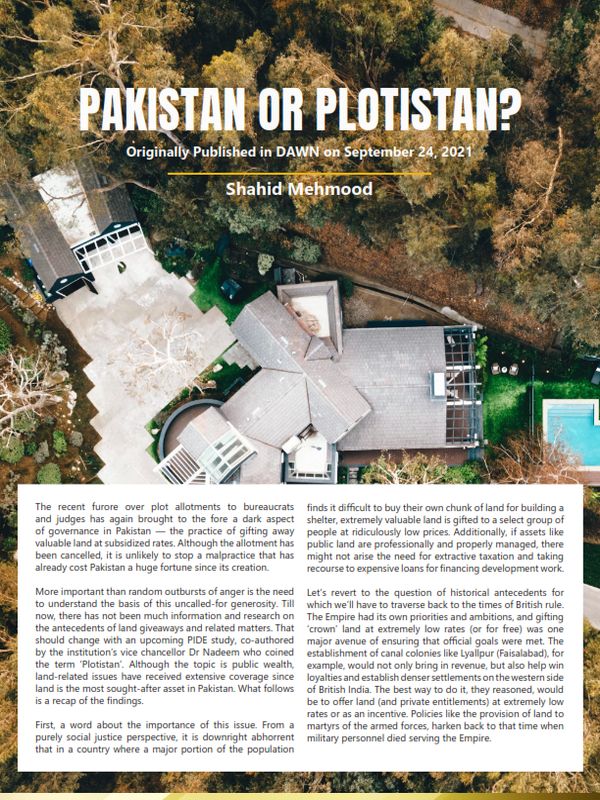
Pakistan Institute of Development Economics
- Home
Our Portals
MenuMenuMenuMenuMenuMenuMenu - ResearchMenuMenuMenuMenuMenuMenuMenu
- Discourse
- The PDR
- Our Researchers
- Academics
- Degree Verification
- Thesis Portal
- Our Portals
Pakistan or ‘Plotistan’?
The recent furore over plot allotments to bureaucrats and judges has again brought to the fore a dark aspect of governance in Pakistan – the practice of gifting away valuable land at subsidized rates. Although the allotment has been cancelled, it is unlikely to stop a malpractice that has already cost Pakistan a huge fortune since its creation.
More important than random outbursts of anger is the need to understand the basis of this uncalled-for generosity. Till now, there has not been much information and research on the antecedents of land giveaways and related matters. That should change with an upcoming PIDE study, co-authored by the institution’s vice chancellor Dr Nadeem who coined the term ‘Plotistan’. Although the topic is public wealth, land-related issues have received extensive coverage since land is the most sought-after asset in Pakistan. What follows is a recap of the findings.
First, a word about the importance of this issue. From a purely social justice perspective, it is downright abhorrent that in a country where a major portion of the population finds it difficult to buy their own chunk of land for building a shelter, extremely valuable land is gifted to a select group of people at ridiculously low prices. Additionally, if assets like public land are professionally and properly managed, there might not arise the need for extractive taxation and taking recourse to expensive loans for financing development work.
Let’s revert to the question of historical antecedents for which we’ll have to traverse back to the times of British rule. The Empire had its own priorities and ambitions, and gifting
‘crown’ land at extremely low rates (or for free) was one major avenue of ensuring that official goals were met. The establishment of canal colonies like Lyallpur (Faisalabad), for example, would not only bring in revenue, but also help win loyalties and establish denser settlements on the western side of British India. The best way to do it, they reasoned, would be to offer land (and private entitlements) at extremely low rates or as an incentive. Policies like the provision of land to martyrs of the armed forces, harken back to that time when military personnel died serving the Empire.



